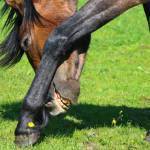Skin Funk in Horses: Omega-3s to the Rescue

When it comes to skin health of horses, every bump and bald patch, however mild or seemingly innocuous, should be examined closely and treated if necessary. As horse owners know, a single bump today can escalate to full-body eruption tomorrow. One common cause of allergic skin disease in horses is hypersensitivity to Culicoides, flying insects known also as midges or no-see-ums.
Horses with persistent problems with Culicoides hypersensitivity are often fed fish oil, such as EO-3 from Kentucky Equine Research, because it’s rich in omega-3 fatty acids, particularly docosahexaenoic acid (DHA) and eicosapentaenoic acid (EPA). For many horses, these omega-3s help decrease the skin problems associated with the midges. In addition to allaying problems with Culicoides, fish oil bolsters the overall health and wellness of the skin and coat.
Researchers recently tested a fish oil-based cream on horses with clinical signs of Culicoides hypersensitivity.* Twenty-eight horses were used in this eight-week study. For the first four weeks, one-half of each horse’s body was treated with the cream, which consisted of concentrated fish oil, moisturizers, and emollients. In the second four weeks, the entire body was treated with the cream to determine its effectiveness on itching.
Twenty-one horses completed the study. Lesions brought about by Culicoides hypersensitivity improved significantly on the sides treated with the fish oil-based cream in comparison to the untreated sides. No improvement was noted in itching, however. Five horses showed adverse effects to the cream.
As researchers fine-tune a topical solution for the effects of Culicoides hypersensitivity, consider offering susceptible horses EO-3, a research-proven nutritional supplement for skin and coat support.
*Huhmann, R., and R.S. Mueller. 2019. A cream containing omega-3 fatty acids, humectants and emollients as an aid in the treatment of equine Culicoides hypersensitivity. Veterinary Dermatology.








